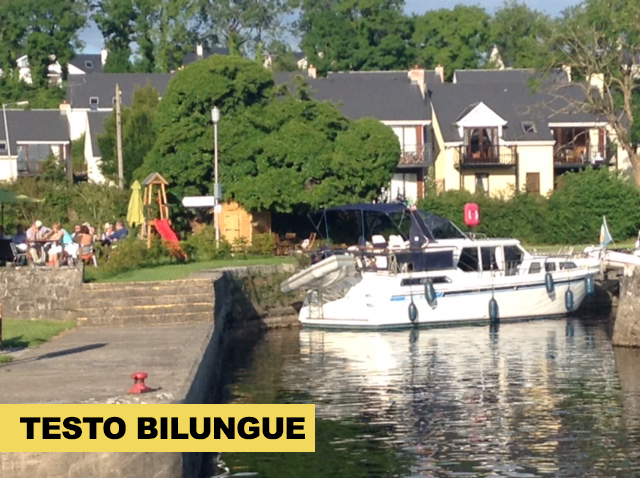
An interview to Sean and Ann, from a rural village in Irland/Intervista con Sean e Ann, da un villaggio rurale irlandese
by/di Simona Maria Frigerio
Ann and Sean are a retired couple who live in a small rural village 70 km from Sligo, a large town on the West Coast of Ireland on the Wild Atlantic Coast. Their home is beside the River Shannon, the longest river in Ireland which, having it’s own little harbour, is a very beautiful place. I’ve been in touch with them for some years and so I thought it would be interesting to ask them some questions on the situation in their country at the moment. (Translation into Italian at the bottom of the page).
How’s the situation in Irland, psychologically speaking?
Sean and Ann: «Like most people throughout the world we are finding Covid-19 a real challenge, but try to keep active both mentally and physically. Not being able to meet up with family or friends makes mental stimulation difficult, although the knowledge that everyone else if sharing the same fate does help. In Ireland people of all ages suffer from social isolation as this country has had one of the longest lockdowns in Europe».
In Ireland, have you got a good public health system or do you have private insurances?
S. and A.: «At the best of times the Health Service here leaves a lot to be desired, and now due to Covid-19 it’s stretched to the limit. Unfortunately this applyes to Mental Health Services too. People are forced to rely mainly on voluntary services. Private Health is a feature of life in Ireland as the poor Public Health Service forces 45% of the population to subscribe to it. That too is now under huge pressure and getting medical appointments even for cancer is so difficult. This of course leads to depression and other mental health problems».
How’s going on the vaccination campaign and how are the people reacting to the news around AstraZeneca?
S. and A.: «In general there is a very high acceptance of vaccination here, although there are those who are anti vaccine too. The roll out of vaccinations has been quite slow but it is hoped that as new supplies come on line this will improve. Sean had his first Pfizer Jab last Friday, with no adverse effect, and Ann hopes to have hers next week. The confidence in AstraZenica is low at present, but as the EU have now approved its use that could change. Sean feels that there is far too much political haggling and that as the Irish EU Commisioner said yesterday: «It’s time for all countries to sit down and deal with this as a World Problem».
How’s the economic situation in Irland?
S. and A.: «Economically we suffer from lack of tourists and lockdown. The hospitality sector, cafes, hotels, restaurants, pubs, etc. have been closed for best part of a year now. Whether they will ever fully recover or not is a major worry, as although our Government are giving a lot of financial support at present this cannot go on forever. Many people are now working from home and this is a mixed blessing. On the one hand it reduces commuting and gives parents more time with their children. The other side of the coin is the denuding of all of our cities of offices and other places of work. Employers love the fact that their overheads are slashed but the cost is huge to smaller city businesses such as cafes, etc.».
Schools and universities are open?
S. and A.: «In regard to schools, all colleges and schools have been closed on and off for nearly a year too. Primary schools reopened last week but colleges and universities continue to work remotely».
What has happened to cultural life?
S. and A.: «Culturally everything such as theatres, museums, cinemas, art galleries have been closed for most of this pandemic and remain closed. Who knows when they will be able to reopen and what will become of all the artistes who now have no living?».
What about sports?
S. and A.: «Sport and exercise are recognised as being good for physical and mental health. With that in mind the Government have tried to keep sport available to people, but as it is seen a contributory factor to Covid transmission it too has been curtailed. Gyms, swimming pools and local sports clubs, including golf and tennis clubs, have all been closed».
Now you’ve to deal with the new Irish border: how do Irish feel about it? And do you think Northern Ireland will call for a referendum to split from the U.K.?
S. and A.: «Brexit has complicated matters not alone between Britain and the EU but also between Britain and The Republic of Ireland. The years since the signing of The Good Friday Agreement have thankfully been peaceful ones and we would all have hoped for that to continue. Unfortunately the Unionist majority in Northern Ireland once again fear a United Ireland, against which they would fight tooth and nail. A referendum will inevitably be held some day, but only when the majority of the citizens of Northern Ireland agree to it. There is little prospect of that any day soon, so we live with the status quo for now. Meanwhile the politicians both Republican and Unionist have now taken up hardline positions again. Neither side will agree on anything and that is what is causing the Brexit problem. This mind you although Northern Ireland got the best imaginable deal being allowed to remain part of The U.K. whilst still trading as an EU member. There should be a law against politics!».
Friday, April 2 2021
On the cover: The little harbour on the River Shannon. Photo ©Sean and Ann (all rights reserved).
Versione in italiano:
traduzione di Simona Maria Frigerio
Ann e Sean sono una coppia di pensionati che vive in un piccolo villaggio rurale 70 km da Sligo, una città sulla Costa orientale dell’Irlanda, affacciata sull’Atlantico. La loro casa è adagiata sulle rive del fiume Shannon, il più lungo del Paese e, avendo il suo piccolo porto, è un luogo di per sé molto bello. Essendo in contatto da alcuni anni, ho pensato di chiedere loro, che la vivono in prima persona, come sia al momento la situazione in Irlanda.
Come state, a livello psicologico, in Irlanda?
Sean and Ann: «Come per la maggior parte delle persone nel mondo il Covid-19 è una vera sfida, ma cerchiamo di mantenerci attivi sia mentalmente sia fisicamente. Non poter incontrare familiari o amici rende difficile avere degli stimoli mentali, sebbene la consapevolezza che tutti stanno condividendo il medesimo fato aiuta. In Irlanda le persone di ogni età soffrono a causa dell’isolamento anche perché il Paese ha vissuto uno tra i più lunghi lockdown europei».
In Irlanda, il sistema sanitario pubblico funziona oppure dovete ricorrere ad assicurazioni private?
S. and A.: «Nel migliore dei casi il sistema sanitario del Paese lascia a desiderare e adesso, a causa del Covid-19, è arrivato al limite. Sfortunatamente, le medesime considerazioni si applicano ai servizi di salute mentale. Le persone sono costrette ad affidarsi ai servizi di volontariato. Il sistema sanitario privato è un tratto comune nella vita degli irlandesi, dato che il sistema pubblico così scadente costringe il 45% della popolazione a sottoscrivere polizze private. Anche il privato, però, è attualmente sotto pressione e ottenere un appuntamento per una visita anche nel caso di un cancro è difficile. Questo stato di cose provoca, ovviamente, stati di depressione e altri problemi psicologici».
Come sta andando la campagna vaccinale e come sta reagendo la popolazione di fronte alle notizie sui possibili effetti collaterali dell’AstraZeneca?
S. and A.: «In generale vi è una larga adesione alla campagna vaccinale, sebbene vi siano anche persone contrarie alla vaccinazione. Il ruolino di marcia è andato finora a rilento ma si spera che se arrivano nuove forniture, la situazione migliorerà. Sean ha avuto la prima inoculazione del Pfizer lo scorso venerdì, senza effetti collaterali, e Ann spera di avere la propria la prossima settimana. Il livello di fiducia nell’AstraZeneca al momento è basso, ma avendo ottenuto l’approvazione da parte europea la situazione potrebbe cambiare. Sean pensa che ci sia un eccessivo mercanteggiare politico e condivide ciò che ha dichiarato il Commissario irlandese dell’Unione Europa ieri: «È ora che tutti i Paesi si siedano a un tavolo e affrontino la situazione come un problema mondiale».
Come va la situazione economica?
S. and A.: «L’economia sta soffrendo a causa della mancanza di turisti e del lockdown. Il settore dell’ospitalità, i caffè, gli hotel, i ristoranti, i pub, etc. sono rimasti chiusi per la maggior parte dell’ultimo anno. Se recupereranno in toto o meno è una tra le maggiori preoccupazioni, e sebbene il Governo finora abbia fornito un supporto finanziario, questo non potrà continuare per sempre. Molte persone ora lavorano da casa e questo ha i suoi pro e i suoi contro. Da una parte, riduce il pendolarismo e i genitori hanno più tempo da trascorrere con i propri figli. L’altro lato della medaglia, però, è la desertificazione delle città – soprattutto nei quartieri produttivi. I datori di lavoro gioiscono del fatto che hanno potuto tagliare le spese generali ma il prezzo, lo sta pagando la piccola impresa, come ad esempio i caffè, etc.».
Le scuole e le università sono aperte?
S. and A.: «Le università e le scuole sono state aperte, chiuse, riaperte per quasi un anno. La scuola primaria ha riaperto la settimana scorsa, ma i college e le università continuano a tenere le lezioni da remoto».
Cos’è accaduto alla vita culturale?
S. and A.: «Teatri, musei, cinema e gallerie d’arte sono rimasti chiusi per la maggior parte della pandemia e tali rimangono. Chi sa quando potranno riaprire? E che cosa accadrà a tutti quegli artisti che non hanno, al momento, alcuna entrata?».
La posizione del Governo riguardo allo sport?
S. and A.: «Lo sport e l’esercizio fisico sono considerati positivi per la salute fisica e mentale delle persone. Tenendo conto di ciò il Governo ha tentato di lasciare gli sport disponibili ma, dato che anche queste attività sono state considerate un fattore che avrebbe contribuito alla trasmissione del Covi-19, sono state limitate. Le palestre, le piscine e i club sportivi, inclusi i campi da tennis e golf, sono stati chiusi».
Dovete nuovamente fare i conti con una frontiera in Irlanda: come vivete la situazione? Pensate che l’Irlanda del Nord indirà il referendum per separarsi dal Regno Unito?
S. and A.: «La Brexit ha complicato non solamente le relazioni tra la Gran Bretagna e l’Europa ma anche tra la Gran Bretagna e la Repubblica d’Irlanda. Dall’Accordo del Venerdì Santo (firmato a Belfat il 10 aprile 1998, n.d.g.) a oggi, fortunatamente abbiamo avuto tanti anni di pace e avremmo tutti sperato continuassero. Purtroppo la maggioranza Unionista in Irlanda del Nord teme nuovamente un’Irlanda unita, idea contro la quale si batteranno con le unghie e con i denti. Un referendum sarà inevitabile, prima o poi, ma solo quando la maggioranza dei cittadini nordirlandesi sarà d’accordo. Ci sono poche possibilità che ciò accada presto e, quindi, al momento stiamo vivendo in una situazione di status quo. Nel frattempo, i politici sia Repubblicani sia Unionisti hanno scelto nuovamente la linea dura. Né gli uni né gli altri sono d’accordo su niente e ciò è causato dalla Brexit. E questo nonostante l’Irlanda del Nord abbia ottenuto la migliore offerta immaginabile, ossia di restare parte del Regno Unito e, contemporaneamente, commerciare come un membro dell’Unione Europea. Dovrebbe esistere una legge contro la politica!».
Venerdì, 2 aprile 2021
In copertina: Il piccolo porto sul Fiume Shannon. Foto scattata da Sean e Ann (tutti i diritti riservati).







